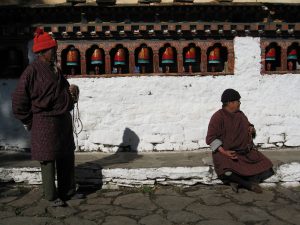In Bhutan, prayers and ceremonies are being offered on a daily basis to ward off the threat of the COVID-19 pandemic. With just seven cases and zero deaths so far, many in the Himalayan Kingdom believe they are being spared by their guardian deities.
Yet while fortune may have played its part, the often overlooked Buddhist nation is emerging as an unlikely success case for how to handle the outbreak with decisive and collective leadership. Indeed, had it not been for the strong initiative taken by its king, government, and citizens, the country of around 750,000 may have faced a terrible fate.
When the virus first emerged, Bhutan seemed particularly vulnerable. The developing nation is landlocked between the world’s most populous nations, India and China, the latter where the outbreak began. Bhutan shares an open border with India and is popular with Chinese tourists. Meanwhile, many Bhutanese students were returning home from highly infected countries around the world, ahead of the various national lockdowns.
Bhutan’s potential exposure to COVID-19 was also matched by the high risk of the virus spreading within its borders. The country has a shortage of doctors, with just over 300 serving the whole country. Its Ministry of Health also counts just one ICU expert, a handful of chest specialists, and a few laboratory experts. The World Health Organization (WHO) did provide an initial round of testing kits but there remain shortages, and a dearth of ventilators and personal protective equipment (PPE). And, although the country is sparsely populated, around one-fifth live in its three most populated urban areas, including the capital Thimphu.
Given that stark reality, an effective and resourceful response was all the more vital. The first case in Bhutan was reported on March 6, when a 76-year-old U.S. tourist tested positive. He received considerable attention and care with an outpouring concern from the public — and even a personal visit from the king. His partner, also a U.S. national, tested positive, and both remained in care with frequent tests until they recovered.
Despite relying heavily on foreign aid, Bhutan’s provision of free universal health care — a key pillar of the country’s Gross National Happiness (GNH) philosophy — proved to be its first line of defense for its “patient zero,” alongside its commitment to regular testing for anyone who is symptomatic, or has come into contact with confirmed cases.
The country’s subsequent rapid mobilization was strongly informed by science, with Prime Minister Lotay Tshering and Health Minister Dechen Wangmo both public health officials before entering politics. A National Preparedness and Response Plan and emergency committee had already been put together in late February. Meanwhile, daily updates, bulletins, and press briefings were made to keep citizens informed on the status of the infections.
After its first two cases, Bhutan immediately began tracing and testing anyone who had come into contact with the tourists. Quarantines of 14 days were initially implemented for anyone entering the country in 120 facilities that were quickly set up; the quarantine period was later extended by a week to reassure the public. Wide-scale lockdowns implemented elsewhere were avoided. Instead, schools were closed in Thimphu, tourists were barred from further entry, and social distancing norms were encouraged.
Meanwhile, the Buddhist Kingdom’s strong sense of community kicked in. Private hoteliers offered their premises for free, businesses offered cash contributions, farmers and farming co-ops offered up agricultural products, and restaurants provided food free of charge. Collaborating with the government, locals helped set up the quarantine zones in villages, with makeshift isolation huts built of bamboo.
Despite its few cases, Bhutan did not refrain from making challenging preventative decisions early. On March 22, the king decided to shut the country’s borders, with provisions to enable the entry of essential goods. For a country that relies heavily on imports, particularly food and fuel from India, as well as tourism, this effectively amounted to cutting off its economic lifeline. A package of loans and relief measures was also quickly announced to help wholesalers, travel firms, and small industries tread water and retain staff.
With countries shutting down one after the other, Bhutanese around the world found themselves home-bound and ended up in strictly enforced quarantines when they landed, as a precaution. Chartered planes were sent out to bring back students and workers who wanted to return but found themselves stranded. By mid-April, several more cases were reported. All were students who had returned from the U.K. and United States. So far, no cases have been locally transmitted.
The visible leadership of Bhutan’s king and some politicians has also been key. The king traveled to most districts, including the southern part of the country, which shares a porous border with India, to help support quarantine efforts. Under his command, Royal Bhutan Army personnel and volunteers are building makeshift houses for the thousands of Bhutanese evacuees who usually live over the border — which is now being manned physically by volunteers to ensure security. The government is also providing food in quarantine facilities, and building finance via a national COVID-19 response fund, which has quickly attracted public donations. Members of Parliament have already donated one month’s salary to the response.
Following an evidence-based approach of testing, effective quarantines, and border control, Bhutan has been able to avoid overloading its limited healthcare system. But the under-resourced nation’s response has been fortified by its traditional communal values, which has seen its king, citizens, and government work in lockstep to support the nation.
Bhutan has gone from the extremes of self-isolation until the 1950s to increasing its connections with the outside world over recent decades. What Bhutan is quickly learning is that while globalization and science are to be embraced, it should also look to its heritage to survive in troubling times.
Sonam Ongmo is a journalist from Bhutan. On Twitter, @sonamwongmo
Tej Parikh is a global policy analyst and journalist. He was previously an associate editor and reporter at the Cambodia Daily. On Twitter, @tejparikh90

































